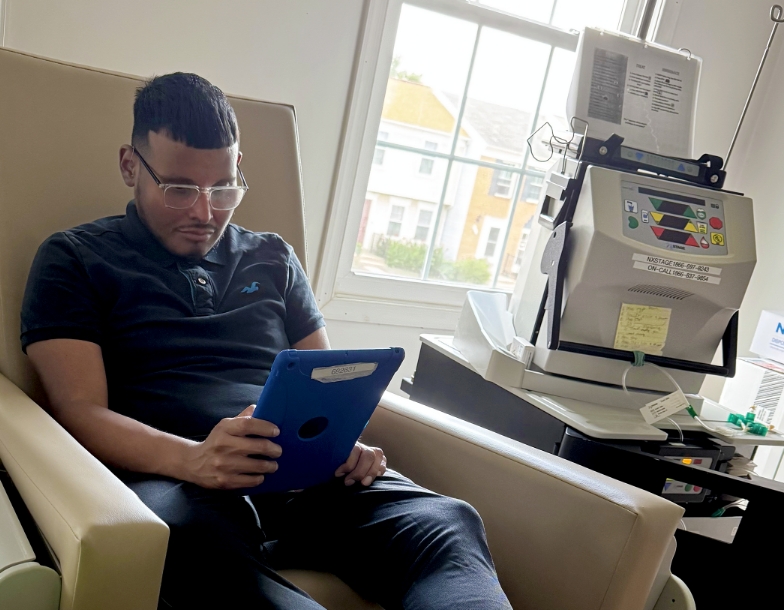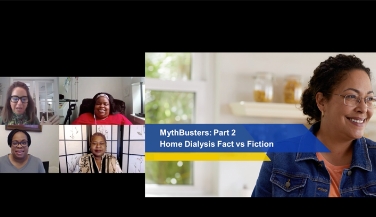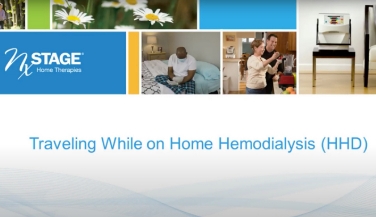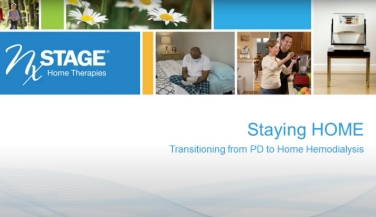Home Hemodialysis Customer Support: 866-697-8243
Peritoneal Dialysis Customer Support: 800-323-5188
Talk to a Patient Consultant About Home Dialysis: 888-200-6456
Home Hemodialysis Customer Support: 866-697-8243
Peritoneal Dialysis Customer Support: 800-323-5188
Talk to a Patient Consultant About Home Dialysis: 888-200-6456
Home Hemodialysis Customer Support: 866-697-8243
Peritoneal Dialysis Customer Support: 800-323-5188
Talk to a Patient Consultant About Home Dialysis: 888-200-6456
Home Hemodialysis Customer Support: 866-697-8243
Peritoneal Dialysis Customer Support: 800-323-5188
Talk to a Patient Consultant About Home Dialysis: 888-200-6456
Webinars
Home dialysis on-demand webinars are educational presentations to help you better understand your treatment choices and support people living with chronic kidney disease. Learn from patients, caregivers, and our experts.
MythBusters Part 1: Home Dialysis Fact vs. Fiction
Are you considering home hemodialysis (HHD) but feeling overwhelmed with questions about self-cannulation, treating without a care partner, and traveling? Our Home Dialysis: Fact vs Fiction webinar series answers some of the most frequently asked questions about…
MythBusters Part 2: Home Dialysis Fact vs. Fiction
Still considering home hemodialysis (HHD) but still want to learn more after watching our first MythBusters Webinar? Then listen to our fantastic patient speaker panel in our second part of this series to learn more common myths and misconceptions surrounding home dialysis: specifically about self-cannulation, prescription and frequency, and nocturnal home dialysis. Hear how they overcame obstacles and barriers throughout their journey home.
The Basics of More Frequent Home Dialysis
More frequent home dialysis, whether it’s home hemodialysis (HHD) or peritoneal dialysis (PD), can potentially provide you with lifestyle benefits and improved health outcomes.
Traveling While on Home Hemodialysis (HHD)
If you are considering home hemodialysis (HHD), it’s important to understand the flexibility it offers when it comes to travel. Unlike in-center dialysis, NxStage® systems offer you the freedom and flexibility to travel when and where you’d like without missing a dialysis…
Staying HOME: Transitioning from PD to Home Hemodialysis
If you are on peritoneal dialysis (PD) and are experiencing potential signs that a transition may be needed such as, declining residual kidney function, decreasing effectiveness of kidney therapy, or more frequent hospitalizations, then switching to home hemodialysis (HHD) may…
Home Hemodialysis: Is it your best treatment option?
Whether you are going on dialysis or are already on dialysis, understanding that you have treatment options is important for you, your family, and your overall well-being. If you are looking for flexibility in your life while on dialysis, or you wish to keep your active…
Risks and Responsibilities
The reported benefits of peritoneal dialysis may not be experienced by all patients.
Peritoneal dialysis does involve some risks that may be related to the patient, center, or equipment. These include, but are not limited to, infectious complications. Examples of infectious complications include peritonitis and exit-site and tunnel infections. Non-infectious complications include catheter complication such as migration and obstruction, peritoneal leaks, constipation, hemoperitoneum, hydrothorax, increased intraperitoneal volume, and respiratory and gastric issues. It is important for healthcare providers to monitor patient prescriptions and achievement of adequate fluid management goals.
Patients should consult their doctor to understand the risks and responsibilities of performing peritoneal dialysis.
Patients should review the following information carefully and discuss it with their doctors to decide whether home hemodialysis with NxStage systems is right for them.
Users should weigh the risks and benefits of performing home hemodialysis with NxStage systems.
- Medical staff will not be present to respond to health emergencies that might happen during home treatments, including, among other things, dizziness, nausea, low blood pressure, and fluid or blood leaks.
- Users may not experience the reported benefits of home, more frequent, or nocturnal hemodialysis with the NxStage systems.
- The NxStage systems require a prescription for use.
- Medical staff will not be present to perform home treatments. Users will be responsible for, among other things, equipment setup, needle insertions, responding to and resolving system alarms, system tear-down after treatment, monitoring blood pressure, ensuring proper aseptic technique is followed, and following all the training material and instructions that nurses provide.
Users will need additional resources to perform home hemodialysis.
- Users will need a trained care partner to be present during your treatment at home (unless their doctor prescribes “solo/independent” home hemodialysis, described below).
- Users must have a clean and safe environment for their home treatments.
- Users will need space in their home for boxes of supplies necessary to perform home hemodialysis with NxStage systems.
Certain forms of home hemodialysis have additional risks.
- If a doctor prescribes home hemodialysis more than 3 times a week, vascular access is exposed to more frequent use which may lead to access related complications, including infection of the site. Doctors should evaluate the medical necessity of more frequent treatments and discuss the risks and benefits of more frequent therapy with users.
- If a doctor prescribes “solo/independent” home hemodialysis without a care partner during waking hours, risks of significant injury or death increase because no one is present to help users respond to health emergencies. If users experience needles coming out, blood loss, or very low blood pressure during solo/independent home hemodialysis, they may lose consciousness or become physically unable to correct the health emergency. Users will need additional ancillary devices and training to perform solo/independent home hemodialysis.
- If a doctor prescribes “nocturnal” home hemodialysis at night while the user and a care partner are sleeping, risks increase due to the length of treatment time and because therapy is performed while the user and a care partner are sleeping. These risks include, among other things, blood access disconnects and blood loss during sleep, blood clotting due to slower blood flow or increased treatment time or both, and delayed response to alarms when waking from sleep. A doctor may need to adjust users’ medications for nocturnal home hemodialysis, including, among other things, iron, Erythropoiesis-Stimulating Agents (ESA), insulin/oral hypoglycemics, anticoagulants, and phosphate binders.
APM4447 Rev. B
350 Merrimack Street
Lawrence, MA 01843
United States
350 Merrimack Street
Lawrence, MA 01843
United States
920 Winter Street
Waltham, MA 02451
United States
920 Winter Street
Waltham, MA 02451
United States
1-866-NxStage (697-8243)
1-866-NxStage (697-8243)
© 2025 Fresenius Medical Care. All Rights Reserved.
© 2025 Fresenius Medical Care. All Rights Reserved.







